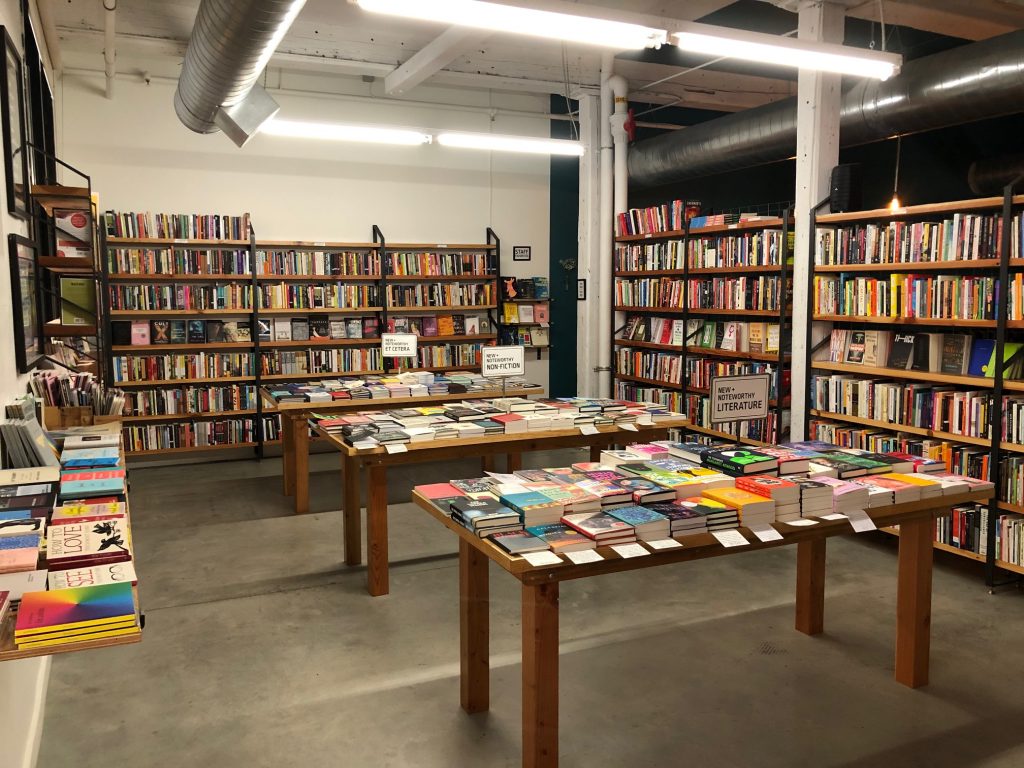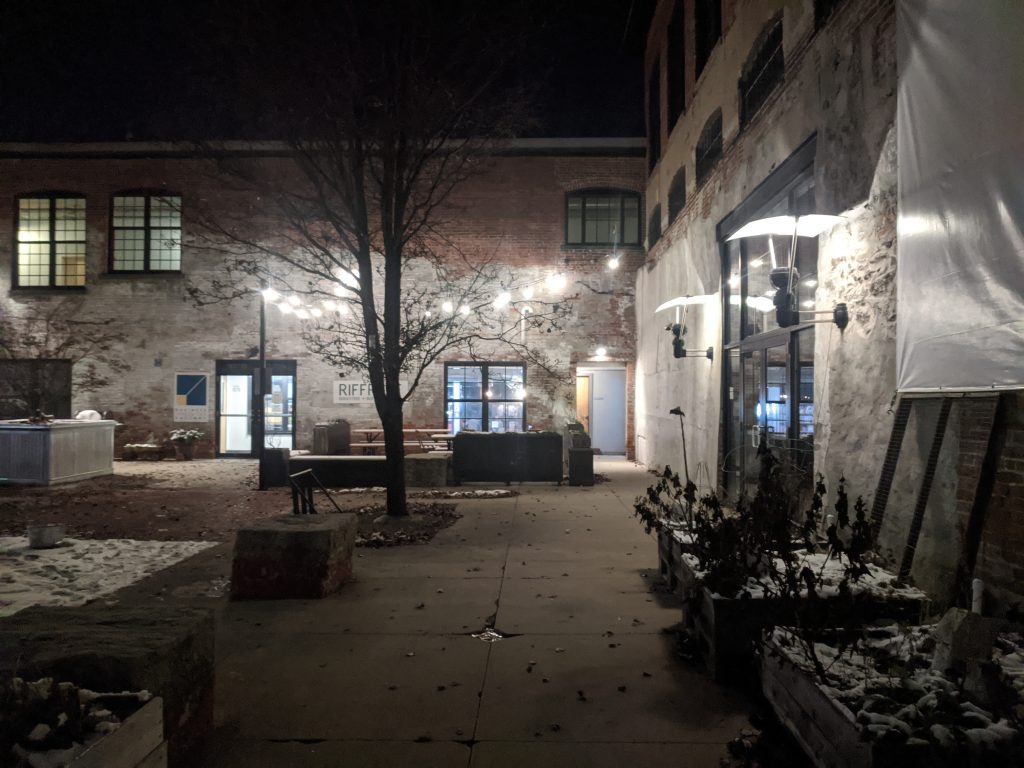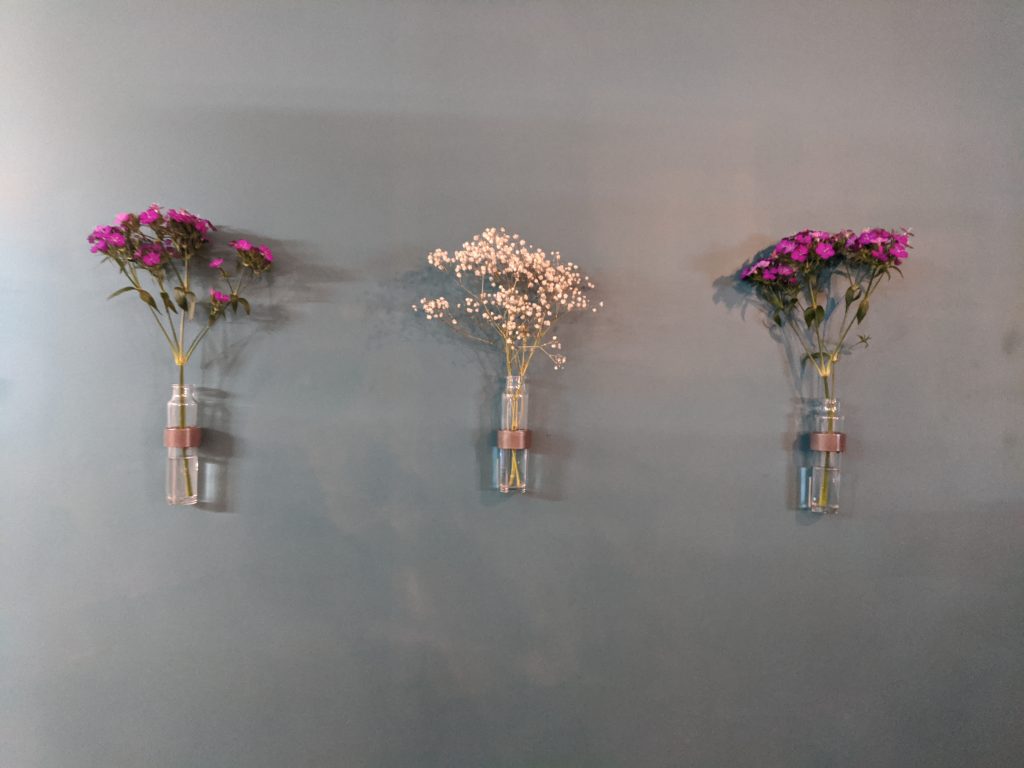Note: Read a Q&A with Rifffraff cofounders Emma Ramadan and Tom Roberge at motifri.com/ramadanroberge

In 1773, well before Olneyville became a Providence neighborhood, Christopher Olney established a place for paper production along the Woonasquatucket River. The Brown George Paper Mill passed to his sons, only to sell at public auction due to financial distress. In 1842, the Providence Dyeing, Bleaching & Calendering Company acquired the site as the textile industry boomed as a major economic force in Rhode Island. Though distant from Southern plantations, the cotton wares were for years part and parcel of a system of enslavement. The manufacturer’s dyes colored and contaminated local waterways. After PDB&C Co. shuttered in 1952, Antonelli Plating claimed some space. Later, Ocean State Metals sorted scrap. Otherwise, much of the site remained vacant until it was purchased in 2004 for $280,000 and the former mill was redeveloped into residential lofts and commercial real estate. In 2017, Emma Ramadan and Tom Roberge opened Riffraff, a bookstore and bar, in a ground-level unit.

From a courtyard in the former industrial complex, a few steps descend along a whitewashed brick wall into a colorful selection of food-and-drink titles featuring the likes of Wine for Normal People, DIY Bitters and Necronomnomnom: Recipes and Bites from the Lore of HP Lovecraft. Adjacent shelves stock children’s books and works in Spanish. A collection of fiction, nonfiction and poetry wrap the room, bending toward translations and the output of small presses. Handwritten notecards identify staff recommendations, such as Ramadan calling Amparo Dávila “one of Mexico’s most criminally overlooked female writers” and Roberge considering Erling Kagge’s Silence: In the Age of Noise “an engaging meditation on creating comfort.” A bookshelf separates the bookstore from the bar, a dimmer space set with communal tables, cushioned loveseats and barstools for a coffee, drink or board game by day or night.

Ramadan and Roberge began to develop the idea that would become Riffraff while living in New York. After Ramadan’s undergraduate studies at Brown University, she completed a master’s degree in Paris and a Fulbright in Morocco. Roberge had lived in Madagascar with the Peace Corps and then worked at independent bookshops and publishing houses. Both were fluent in French. After they met in 2015, Ramadan mentioned visiting the Spotty Dog, a bookstore and bar located in a former firehouse 125 miles north in Hudson, New York. She confided in Roberge that she wished to create a comparable kind of space. He said he did too.
“We realized almost immediately that we both had this dream,” said Roberge.
“The plan was put into motion,” said Ramadan.

As they brainstormed where to establish their business, Ramadan suggested Providence. The literary arts faculty at Brown University like Cole Swensen and Forrest Gander, Ramadan said, “made it feel like the community of writers in Providence was something very special and that people like that were being drawn here.” But Ramadan also recognized she was less familiar with the literary scene beyond her alma mater, and she and Roberge began to visit more often. The more time they spent, the more they were convinced. Roberge credited AS220 and Dirt Palace for encouraging strong connections between art and literature in the city.
“It just seemed like the kind of people that we were imagining as our customers were here,” said Ramadan. “The community of independently owned bars and restaurants and shops is really special, I think, and businesses want to help each other.”
After registering Riffraff as a business in early 2016, Ramadan and Roberge moved to Providence that June. Despite planning on a different location and an earlier opening date, more than a year passed before they announced their bookstore and bar would have a home at 60 Valley Street in Olneyville. Ramadan recalled the period not only as a stressful time, but also as an opportunity to get to know other local business owners. On December 7, 2017, Riffraff welcomed its first customers.
“At the beginning, we were here every single hour of every single day,” said Ramadan. “At least one of us, but often both of us. And just the physical toll that will take on you, the emotional and mental toll it takes on you, the sheer exhaustion of having to be on all the time.”
Ramadan and Roberge celebrated their wedding nearly seven months after opening Riffraff, and they closed their bookstore and bar for two weeks while on their honeymoon. After returning, they trimmed a few hours off what had been a 76-hour work week — before counting their labor outside business hours. Having learned how to bartend as well as sell books, after their first year they had a better schedule and hired employees to help.
“We’ve become really close with a lot of our regulars,” said Ramadan. “And it does feel like a little family of people that we didn’t know before opening and probably would not have met otherwise.”
On December 7, 2019, Riffraff marked its second anniversary with a book sale and a champagne special. Hundreds of customers stopped by throughout the day, arriving from as far away as Philadelphia, and a crowd gathered late into the evening.
“Just thank you all for being here,” Roberge said to cheers as he spoke from a step stool between the bookstore and the bar. “It’s a rough business, but we are surviving and we are surviving because of you.”
Looking ahead, Roberge said he would like to fine-tune Riffraff’s events, including pop-ups with local restaurants. Ramadan continues to carve out dedicated hours to manage her career as a literary translator. Her next publication is Iranian exile Javad Djavahery’s debut English novel, My Part of Her, which Restless Books will release next month. Djavahery will join Ramadan for a discussion at Riffraff on Wednesday, February 26.
On the back wall near the bar at Riffraff, two analog clocks affixed side by side tick forward, a D.I.Y replication of artist Félix González-Torre’s work, Untitled (Perfect Lovers).
“Like two people, you start out in sync and then you can kind of get out of sync in the relationship and then you can reset and be back in sync again,” said Ramadan. “It’s like the cycle of relationships. That’s our interpretation.”
The traditional gift for a first anniversary is paper. For a second, it’s cotton. From a space that processed both, Ramadan recommends reading Kindred by Octavia E. Butler. Roberge suggests Colson Whitehead’s Underground Railroad. On the site of the former mill, their bookstore and bar stands in stark contrast to the photos submitted of the property to the National Register of Historic Places, its exterior windows shattered and boarded, interior walls tagged with overlapping graffiti, floorboards warped, piping collapsed and stone foundations crumbling. In a place long seen in disrepute and disrepair, Riffraff enters its third year.
“As with so much of this city and part of the country, these old buildings have been through a number of iterations, each leaving its mark,” said Roberge. “We love it here.”



